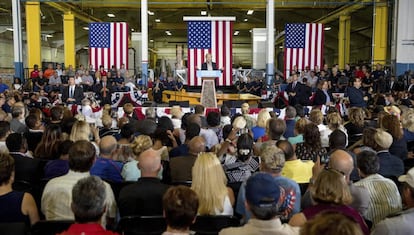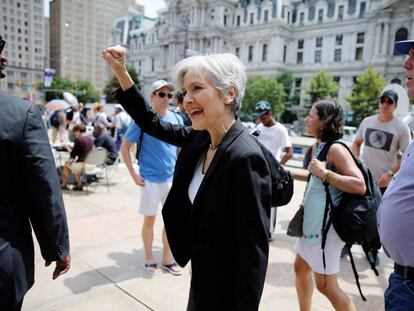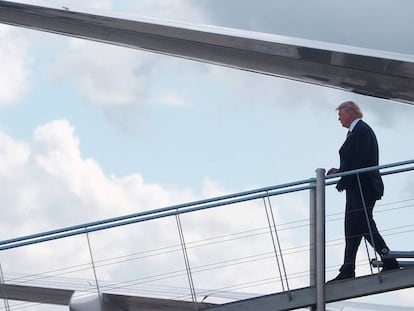Clinton and Trump compete for the white working class vote
The Democratic candidate accuses her Republican rival of wanting to lower taxes for himself and his friends

On Thursday, Democratic presidential nominee Hillary Clinton traveled to Macomb County, a stronghold of working class voters, to unveil her economic plan for the country. Clinton accused her Republican rival, Donald Trump, of being a hypocrite who tries to speak for workers while planning to lower taxes on rich individuals like himself. Trump outlined his own proposals to promote growth in nearby Detroit three days before.
Macomb is located on the outskirts of Detroit, Michigan, the former automobile capital of the United States, a good place to take the pulse of manufacturing work. In the 1960 presidential election, Democrat John Kennedy beat Republican Richard Nixon in this suburban county. Kennedy received 63% of the votes. Four years later, Democrat Lyndon Johnson lured 75% of Macomb voters. But then something happened over the following 20 years because Republican Ronald Reagan carried the county with 66% in 1984.
How does one explain this reversal? The mystery inspired Stan Greenberg, a polling expert, to study Macomb County and coin the term “Reagan Democrats.” Those ex-Democrats, white and without university education who watched, aghast, as the Democratic Party became the club of urban elites, minorities and anti-war movements.
Both candidates are against the Trans-Pacific Partnership (TPP), a free trade agreement between several countries on the Pacific, including the United States
“These white Democratic defectors express a profound distaste for blacks, a sentiment that pervades almost everything they think about government and politics,” Greenberg wrote. “Blacks constitute the explanation for their vulnerability and for almost everything else that has gone wrong in their lives; not being black is what constitutes being middle class; not living with blacks is what makes a place a decent place to live.”
Racial tension partly explained the inversion that took place in Macomb and it partly explains the rise of Donald Trump today. Three decades after Reagan Democrats came on the scene, Macomb and the rest of the industrial Midwest are the main battleground in this presidential campaign. Trump shared his plans for growth here in Detroit on Monday and, three days later, Clinton traveled to Warren, a city in Macomb County, to present her economic plan for the country.
“When [Trump] visited Detroit on Monday, he talked only of failure, poverty, and crime,” Clinton said in reference to the GOP candidate’s gloomy vision of the United States. He’s missing so much about what makes Michigan great,” she added.
Clinton’s objective in Warren was to expose the contradictions in her rival’s speech. Trump uses populist language and presents himself as the defender of white workers who do not hold university degrees or, in his words, “the poorly educated,” his most faithful supporters. Yet his program includes drastic tax cuts that will benefit the richest individuals, “him and his friends, at the expense of everyone else” according to Clinton.
The Democratic candidate says the GOP nominee is recycling old Reagan theories based on the notion that if the rich pay less in taxes, they will invest more and those investments will boost economic growth and benefit society at large. These policies, according to Democrats, have led to more inequality and hurt the manufacturing workers Trump says he is defending.
Trump, for example, plans to eliminate the estate tax or what conservatives like to call the “death tax.” The government collects inheritance tax on any estate worth $5.45 million. Estate tax, therefore, only affects millionaires like Trump, not the working class that he is courting with his anti-establishment rhetoric.
Meanwhile, Clinton still has trouble connecting emotionally with this segment of the electorate. Yet she thinks she can draw them in with a progressive platform including some ideas that came from her rival in the primaries, socialist Senator Bernie Sanders. Clinton promises more investment in job creation, free tuition at public universities for middle class students and higher taxes on the richest individuals and large Wall Street businesses.
Sign up for our newsletter
EL PAÍS English Edition has launched a weekly newsletter. Sign up today to receive a selection of our best stories in your inbox every Saturday morning. For full details about how to subscribe, click here
Both candidates are against the Trans-Pacific Partnership (TPP), a free trade agreement between several countries on the Pacific, including the United States. Protectionism, the belief that free trade agreements have hurt the middle class, is at the center of the political debate in the United States right now.
The impact of an economic speech in places like Macomb County is key. Democrat President Barack Obama won this county, the homeland of Reagan Democrats, in 2008 and in 2012. Macomb is now Democratic Party country. If Clinton maintains control of this and other post-industrial Midwest counties in November, she will have won half the election.
English version by Dyane Jean-François.
Tu suscripción se está usando en otro dispositivo
¿Quieres añadir otro usuario a tu suscripción?
Si continúas leyendo en este dispositivo, no se podrá leer en el otro.
FlechaTu suscripción se está usando en otro dispositivo y solo puedes acceder a EL PAÍS desde un dispositivo a la vez.
Si quieres compartir tu cuenta, cambia tu suscripción a la modalidad Premium, así podrás añadir otro usuario. Cada uno accederá con su propia cuenta de email, lo que os permitirá personalizar vuestra experiencia en EL PAÍS.
En el caso de no saber quién está usando tu cuenta, te recomendamos cambiar tu contraseña aquí.
Si decides continuar compartiendo tu cuenta, este mensaje se mostrará en tu dispositivo y en el de la otra persona que está usando tu cuenta de forma indefinida, afectando a tu experiencia de lectura. Puedes consultar aquí los términos y condiciones de la suscripción digital.











































